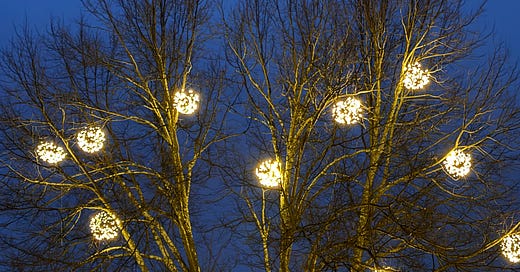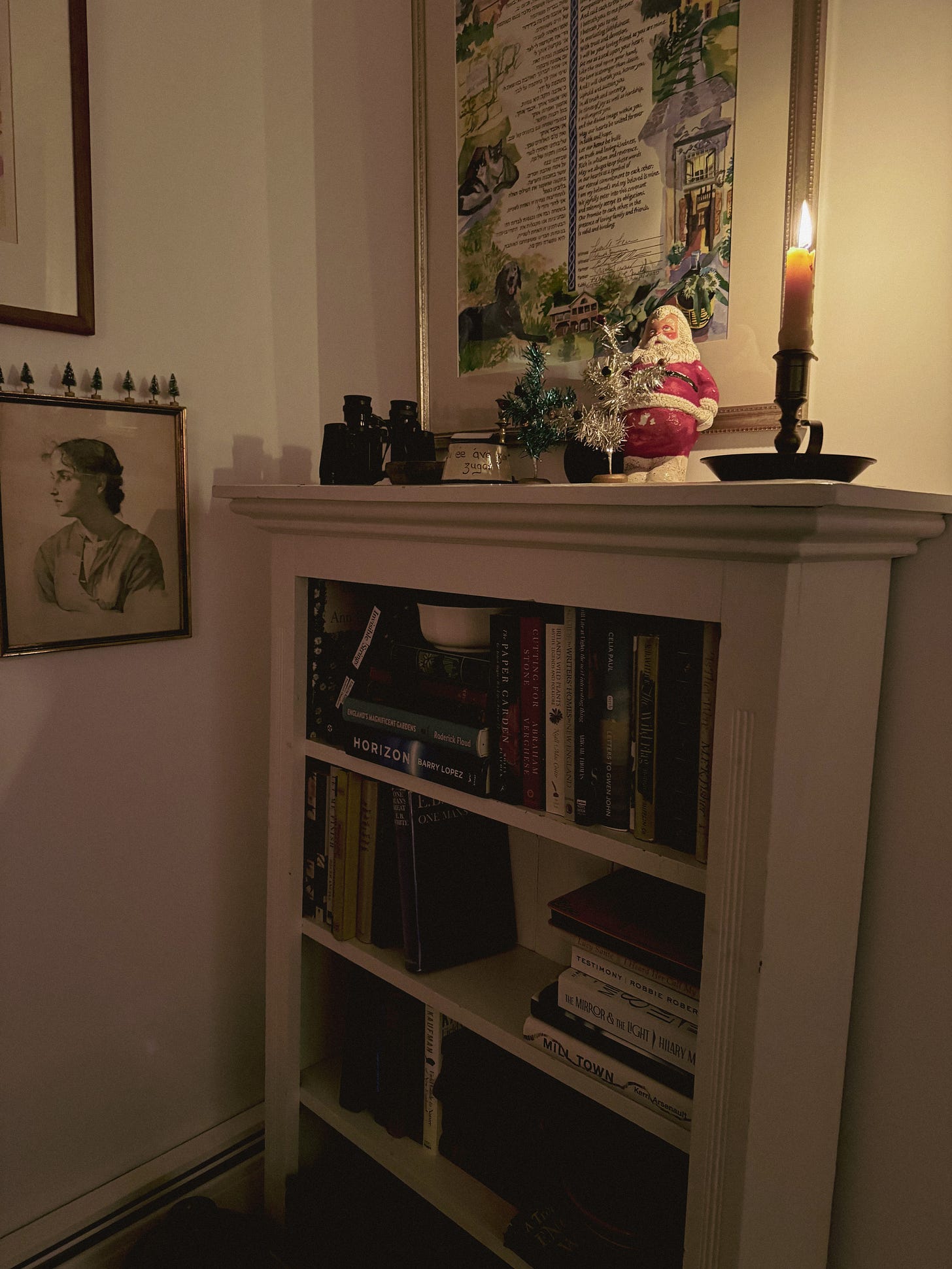This was our holiday of quiet, and I stepped into it with some foreboding.
I grew up as someone who was not Christmas-observant beyond the usual mid-century American cultural markers: the schmaltzy holiday songs, some of them remnants of World War I, which were taught to me by my maternal grandmother who was a teenager during that terrible time; the Christmas windows at the long-gone Lord & Taylor in New York City, which were inevitably Victorian/Edwardian, with mechanical blond-haired fathers in waistcoats and white tie, clunkily slicing a papier mache roast beef while small robotic terriers bit at their heels; the lighting of the Christmas tree at Rockefeller Center; The Nutcracker at Lincoln Center; Telia, the jaundiced, toothless dry cleaner down the street from us, who carried a flask of gin in the pocket of her gray work smock and still managed to produce for every single neighborhood child of every background a Santa made of a baking apple, marshmallows for head/arms/legs, and cloves for eyes and tunic buttons. The books I received every year from family friends, which I now recognize as having been illustrated by N.C. Wyeth.
But it was a bit of a mindfuck because we did not actually celebrate Christmas, and every time I innocently inquired as to why — because we’re not Christians was the answer — it was met with my own response of confusion and want, and my father’s of unbridled rage. After which my grandmother would dry my eyes, bundle me up, and take me on the subway directly to St. Patrick’s Cathedral where we would wait in line for hours to see The Baby Jesus in the manger behind the altar.
I have spent many years unpacking all of this, therapeutically.
From the vantage point of sixty years hence, I can look back and see that my response to the holiday season was absolutely not my fault, nor was it a manifestation of being spoiled (the worst possible and cringe-worthy gaslighting accusation my parents could muster, which as a child made me hate myself). All children are drawn naturally to joy and color (and certainly gift-giving) and wonder. Whoever they are and however they were raised culturally, ethnically, or spiritually, this much seems true: they understand intuitively the concepts of hope and promise, which makes it that much more horrifying to see them, whoever they are, having been stripped of that in the name of war, terror, trauma. Because children are children, and they cling like crazy to hope and promise. And when someone comes along and says No, sorry, this joy is not for you, it spins their internal compass like nothing else.
I can recall the moment this all changed — when I realized that Christmas and midwinter holidays were not about religious observance for me, but about the magic of light against darkness, and the ineffable. I was in my twenties and living in my late paternal grandmother’s apartment in deepest Brooklyn, having been through a miserable breakup with a woman no one knew I was involved with. I was isolated from my friends and everything I knew — it took two hours by subway to get into the city — and living in an apartment I’d visited every Sunday of my childhood, which was perpetually stuck in 1934, when my grandparents first moved in. The building was dark and dank and depressing — the lobby stank of half a century of chicken fat — and when I moved in, I discovered that my father and aunt had left all of my grandmother’s things in place when she died a year earlier, including a half-eaten jar of gefilte fish in her refrigerator. On one freezing night right after Christmas, the sound of traffic became muffled; everything stopped. I was getting ready for bed when I looked out the window and saw that it was snowing massive, quarter-sized flakes that were blanketing the streets and the sidewalks, the parked cars, the meters, the streetlights. I was dressed that night in a very oversized Boston University sweatshirt over black leggings — my version of loungewear — and without thinking I pulled on my boots, grabbed my keys, ran down the stairs into the lobby, and out to the front steps of the building. I turned my face to the sky and stretched my arms up and turned circles like a child, around and around, in a dance of utter joy. And then I sat down on the steps in the very cold and let the snow blanket me too.
I learned something new that night: Winter was my holiday. This was my turning of the year. It was epic, and it was beautiful, and it pulled me out of the stupor I had been in for months. When I finally went back upstairs, soaking wet and covered with snow, I discovered that I was not the only one touched by it: my two cats, Cleo and Viola, were perched side by side on the deep living room windowsill, their backs to the room, watching it fall.
It seems that magic is magic, whoever you are.
There is so much that I have not done, not read, not listened to, not cooked, not seen, not experienced, that all of these things, should I choose to do them, qualify as learning something new.
I am not one for New Year’s resolutions; they always end up being a recipe for failure and (in my case) the inevitable self-loathing that follows it and to which I am easily prone. But this year, as we in my country head into a time of political extremism and the unthinkable, I have realized this: the life-change that accompanies learning something new cannot be underestimated. By this I mean actually learning something new — remember in T.H. White’s The Once and Future King, when Arthur is told by Merlin that the cure for a broken heart is learning something new — but also experiencing the world from a new and different vantage point, and one that has never before been a part of one’s life. It has taken me years — decades — to fathom this fact: there is so much that I have not done, not read, not listened to, not cooked, not seen, not experienced, that all of these things, should I choose to do them, qualify as learning something new. I have been so fearful, and so worried. I have been bored, distracted, and often hopeless, driven by the fact that I am a self-employed writer with a very dodgy income, who supports a deeply troubled elderly parent; I have not been able to draw lines and boundaries. I have devoted so much of my time and energy to the care of someone who is a spirit-siphon that ignoring my own life — what I want and what I don’t — is actually required of me to do the job I am tasked with.
It has not been in vain, though. The single greatest thing I have ever done in service of learning something new was leaving New York in 2001 and beginning my life with Susan, to the absolute shock and horror of my mother. What exactly was my learning something new in this case? Discovering that I was an adult woman who loved another woman and wanted to spend my life with her. Discovering that I would have to learn how to be a good partner, having grown up in a home with two parents who set out, every morning and every evening, to hurt each other in inconceivable and deceitful ways. Discovering that arguments do not always mean the end; they mean compromise and acceptance and patience. Discovering that having one’s life be dictated by traumas so deep that they have grooved deadly habits is not normal. Discovering that boundaries are self-kindnesses rather than ways to be rude, or to harm. Discovering fairness. Discovering the beauty of the garden, and of quiet, and of walking in the snow with the dog.
And when I left New York to learn to live in this new and different way, it was mid-December, right before Christmas.
When I teach memoir workshops, one of the things that I ask of my students is that they think of the process of writing about one’s own life as making an inquiry and coming out the other side of it having learned something about themselves and their characters that they did not know going in. This is what we are all meant to do. Why did I feel about Christmas the way I did, as someone whose family didn’t observe it? Because I was looking for the light against the dark, for metaphor, for evidence of hope and the visceral change that comes with it. Why have I let my fears dictate my dreams and desires? Because I grew up being taught that the devil you know is far safer than the devil you don’t. All of these are examples of learning something new, as Merlin implored Arthur to do.
So: I went into our Christmas season with foreboding because it was going to be so quiet — just the two of us, and Fergus (our new rescued Golden Retriever), and our cats. We spent much of it cooking and listening to music. Susan baked enormous batches of cookies. I brought the outside in, cutting giant swags of pine and holly for the dining room table. I lit beeswax candles that changed the light of our home. And I read things I have never read before, like Tove Jansson’s A Winter Book.
Do not tire; never lose interest, Jansson wrote.
This will be the thing I hope to learn and to keep in the new year and beyond, no matter how the world changes around me.









My practice this year: a small notebook in which I will record, each day, one good thing. It may be something I see or hear (today it was the Western Bluebird in the neighbor’s holly bushes) or something that I’ve read or listened to, or something one of the grandkids did that gave me what my own grandmother would have called nachus. There is enough out there that will break my elderly heart if I let it. I am going to practice finding and holding what lifts me up, and giving thanks for it. Right now I am thankful for your fine writing, Elissa. May the coming year be good to you.
Elissa, your words brought tears to my eyes. I well understand and can relate to the sadness and traumas you experienced under the guise of “good parenting “. But somehow you always knew there was more. And at the age of 67, I am letting myself discover that “more”. The beauty of watching birds fight over the seed I feed them every morning. The beauty of sweet music playing while I read, bundled up in a blanket. The beauty of my daily walks in the woods, talking to the deer with their furry winter coats. I always thought there was supposed to be more. And now I’m discovering that there is…and always has been….right in front of me.
Wishing you a glorious and magical “Wintering”.